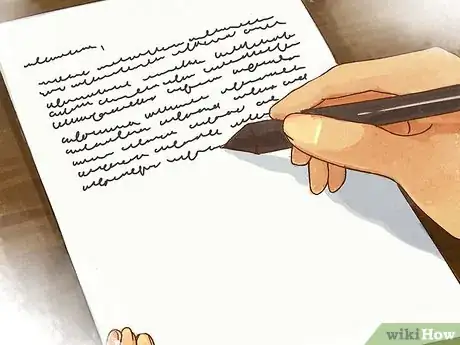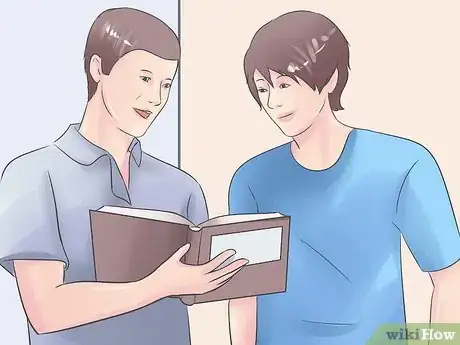This article was co-authored by Jonathan DeYoe, CPWA®, AIF®. Jonathan DeYoe is a Financial Advisor and the CEO of Mindful Money, a comprehensive financial planning and retirement income planning service based in Berkeley, California. With over 25 years of financial advising experience, Jonathan is a speaker and the best-selling author of "Mindful Money: Simple Practices for Reaching Your Financial Goals and Increasing Your Happiness Dividend." Jonathan holds a BA in Philosophy and Religious Studies from Montana State University-Bozeman. He studied Financial Analysis at the CFA Institute and earned his Certified Private Wealth Advisor (CPWA®) designation from The Investments & Wealth Institute. He also earned his Accredited Investment Fiduciary (AIF®) credential from Fi360. Jonathan has been featured in the New York Times, the Wall Street Journal, Money Tips, Mindful Magazine, and Business Insider among others.
wikiHow marks an article as reader-approved once it receives enough positive feedback. In this case, 100% of readers who voted found the article helpful, earning it our reader-approved status.
This article has been viewed 286,371 times.
Lending money to a friend is a dangerous game that should be avoided if possible. Unfortunately, at one point or another, a friend may approach you for a loan, and you will be forced to make the difficult call of whether or not to give it to them. Before handing over the money, think carefully about whether or not you should give the loan. If you decide to give them the loan they need then it is important to document the transaction in order to make it legally enforceable, and don’t be afraid to remind them about the money they owe you. If it comes to it, take legal action to get the money that is owed to you.
Steps
Deciding Whether or Not to Loan the Money
-
1Decide whether or not you are willing to loan them the money. You are not obligated to lend anyone money, and many friendships have ended over unpaid loans. Therefore, you should think carefully about whether to lend them the money, especially if it is a larger loan.
- It's probably best if you don't lend money to friends who tend to behave irresponsibly with money.
- If your friend just needs a couple of dollars to cover lunch, don't overthink it. You might even need them to return the favor one day.
- If they need money to pay bills after being laid off, ask yourself if they're normally responsible. If so, they'll probably do everything they can to pay you back.
- On the other hand, if they are asking for $1,000 to take their new girlfriend on a trip to Las Vegas, think twice before agreeing to lend them the money.
-
2Determine how important it is to be repaid. When lending money to a friend (or to anyone, for that matter), there is always the risk that they won’t or can’t pay it back. Therefore, before you decide to lend them money, think about how that will affect you if you never get that money back.[1]
- If you won't be able to pay your bills if your friend doesn’t pay you back on time, you definitely can't afford to lend the money.
Advertisement -
3Think of the loan as a gift. If this is a friend who is very important to you, then it may be wise to simply think of the loan as a gift. If you have the feeling that they are not going to pay you back, but you want to loan them the money anyways, then just tell yourself it’s a gift. This will help you from becoming resentful if they don’t pay you back after all.[2]
- You can still tell the friend that the money is a loan and that they should pay you back when they can.
-
4Discuss the loan with your friend. Before taking steps to give them the loan, you should discuss the loan with the friend, especially if it is a large sum. You have a right to know what the loan will be used for, and why they don’t have the money. Explain that you don’t want money to ruin your friendship, so you want to talk about how the repayment of the loan will be handled.
- Be honest with your friend. Tell them that you want to help out however you can, but that you also have to look out for yourself.
- Point out that is very important to keep the lines of communication open, and that if there is a problem with paying the money back that they should talk to you rather than avoid you.
- If you feel embarrassed being so forward about the subject, tell them that your spouse/lawyer/accountant is making you be clear about all this in order to protect your own financial interests.
- Ask them why they aren’t getting a loan from a professional lender, especially if they're asking to borrow a large sum of money.
-
5Don’t be afraid to say “No.” In some cases, you may not be able to afford to loan the money or you may not want to. Whatever the reason, say “no” if you need to. If the reason you don’t want to lend the money to your friend is because you don’t think they’ll pay you back, but you want to maintain your relationship, it may be best to give a different reason why you won’t be giving them the money.[3]
- For example, you can say, “As a personal rule, I don’t lend money to friends. It can really mess up a friendship.”
- If they put you on the spot, tell them you have to look at your budget first. Then, send a text or email later saying you can't afford the loan.
Legitimizing the Transaction
-
1Create a contract. Especially if you are lending a large sum of money (what “large” means depends on what you believe is a large sum), it is critical that you create a document that lays out the terms of the loan. This document will lay out who is lending the money, and to whom, how much money is being lent, when the borrower is expected to begin paying back the money, and when the sum should be paid in full. The document should also include any interest that is to be repaid.[4]
- A contract will protect you if your friend doesn't pay you back. It will also spell out the terms of the loan, which can help avoid any misunderstandings.
- Remember to have the borrower sign and date the document, as it will not be enforceable without their signature.
-
2Make sure that the document is legally enforceable. Most states follow the Uniform Commercial Code (UCC). The UCC states that in order to be legally enforceable the document must include the following information:[5]
- It must be a written document that is signed by the borrower. You, as the lender, may also sign the document, but you don’t have to.
- The document must promise the payment of money.
- The document must state a fixed amount of money (with or without interest).
- There must be a definite time that the money should be repaid.
- The money must be payable to a holder. As the lender of the money and the holder of the document, you are the holder.
- The document should only pertain to the money to be repaid. That is, there should be no other acts included in the document.
-
3Include a repayment plan. In the document, you should lay out when you expect to start being repaid, and when your friend should pay you in full by. Make sure to include any interest that you expect to receive, as well as what the consequences are if a payment is not received on time.
- For example, if you lend your friend $500 on February 1, you might lay out a plan that says that they are to begin paying you back on April 1.
- You might also state that each month, they should pay you $100, with no interest for on-time payments and 5% interest for payments more than 5 days late.
- It's fine to work out the details of the payment plan with your friend. Just be sure to get it all down in writing.
- Charging interest is not mandatory.
-
4Get the document notarized. Having a document notarized is important because it requires a third party to verify that the people signing the document are the people they claim to be. This is important because your friend won't be able to come back and say that you forged the signature, as it has been notarized. This usually will require both of you to go to a notary public (banks usually have one notary public on staff, but attorneys can also notarize documents) along with two pieces of photo identification, and the document to be notarized.
- Understand though, that notaries do not offer legal advice, nor does having a document notarized imply that the person signing the document understands what is in the document.
- It may seem like a lot of trouble to do all of this, but it is for your own protection.
- If your friend says you aren’t being a good friend by making them go through all of this, then you might want to rethink the loan, as a good friend will understand that you are only looking out for your own well-being.
- Keep the original of the document for yourself, and make a copy for your friend so that both parties can refer back to it as necessary.
Asking for Repayment
-
1Remind yourself that you are entitled to the money you lent. If your friend isn’t paying you back according to the schedule, then it’s time to take action. Before resorting to legal action, though, you should try talking to them. There may be reasons that they haven’t sent you payment, or they may have simply forgotten. Sometimes, people feel bad bringing up such a subject, but in this case, you should definitely not.
- Remember that it is your money that you earned, and they felt that they could ask you, so you can ask for it back.
-
2Give them a call or write an email to see what’s going on. The first time you contact them about why they haven’t repaid you, try to keep it light and casual. Make it clear that you’re not accusing them of avoiding repayment, but that you’re concerned for their welfare, and want to be of help if you can.
- For example, you can say something like, “Hey, is everything OK? You were supposed to send me a payment yesterday, but I didn’t notice anything in my bank.”
- Try not to come across as angry—that will make them feel defensive.
-
3Try to be understanding of their situation, at first. If this is a friend you have known for a very long time, and that you trust completely, it is OK to give them a little wiggle room, if you want. If you get in touch with them, and they explain that they had not forgotten about the payment but that their child broke his arm, and they needed the money to pay for the doctor, but that they can get it to you next week, then it may be wise to give them the benefit of the doubt.
- If the other person doesn't seem apologetic or concerned about late payments, it's okay if you don't feel like being flexible.
-
4Warn them of what will happen if they don’t repay you. If your friend continues to avoid repaying you, tell them what will happen if they don’t pay you back. This is not a suggestion that you should threaten them with violence, but rather that you won’t just give up on getting paid back what you’re owed. For example, explain to them that if they don’t pay you back, you won’t ever be able to loan money to them again.
- You may also say that their failure to stick to their end of the deal has really damaged your trust in them.
- Remind them also, that you have a written agreement. So not only are you able to withdraw your friendship, you are able to take them to court if you want to.
-
5Begin sending past due notices. If you think that you are eventually going to have to take your friend to court, it is important to create a paper trail. Therefore, sending them past due notices in writing after 30 days, 60 days, and 90 days will help you to establish what happened in the event that legal action is taken.[6]
- Be sure to keep copies of the letters and send them via certified mail so that your friend won’t be able to say they never received them.
- State in the letter the terms of the loan and when they were supposed to have paid you.
-
6Let them know you will pursue legal action. If your friend continues to avoid paying you back, it may be time to get tough, especially if you don’t believe the reasons that they’re giving you as to why they haven’t paid you back. Contact them again, either by email, phone, or in person. Calmly let them know that you didn’t want it to come to this, but that if they can’t pay you back the money they owe up to that point by a certain date, that you will be taking legal action.
- This does risk ruining your friendship, but it may be the only way to get your money back.
Taking Legal Action
-
1Decide if getting the money back is more important than the friendship. If you have tried to get the money back from your friend by talking to them but it doesn’t seem like they are going to pay you back, you have two options. You can just give up and convince yourself that the money was a gift, or you can take legal action to get the money back. However, if you do decide to take legal action, realize that there is a decent chance your friendship will be over.
- Depending on the size of the loan, it may be worth taking legal action even if it does ruin your friendship.
- If you feel bad, remember that someone who borrowed a large amount of money and didn’t care enough to pay you back is not your friend.
- Any money you gift to a friend is not tax deductible. Furthermore, you may be subject to the gift tax if you gave them over $13,000 in a calendar year.[7]
-
2Prepare your documentation. Hopefully you have taken steps to protect yourself from this occurrence, so you will have your signed, notarized document stating that you lent money to your friend and that they were supposed to have paid you back by a certain date. If you do not have such a document, you may still be able to take them to court as oral contracts are considered binding. The problem is that the existence of oral contracts are very difficult to prove.
- If you had an oral contract, you might be able to prove that such a contract exists if there was a witness to the agreement.
- Gather any emails or texts you've sent asking them to repay the loan. This will demonstrate that you’ve tried to resolve the matter by other means.[8]
-
3Hire a lawyer. At this point, you will need to hire a lawyer who will guide you through the process of taking your friend to court. The lawyer may begin by writing an official letter to your friend asking them to repay the money that they owe you or be ready to deal with the issue in court.[9]
- Sometimes, an official letter such as this will be enough to motivate your friend to start repaying what they owe.
- You will have to pay the lawyer for their services, so be sure that the money you are to be repaid will be more than the amount you'll owe the lawyer.
-
4Settle your dispute in small claims court. Unless you have lent your friend an extraordinary amount of money, you will likely deal with the matter in small claims court. If you have hired a lawyer, they will guide you through the process of filing a claim. If you haven’t, you will need to contact the county clerk where you live (or where any agreement you created was signed), as the rules for filing a claim vary from state to state.[10]
- Generally, you will need to fill out a complaint form, pay a $15—$100 filing fee, and sign an affidavit confirming that you have tried to resolve the issue outside of court.
- Then, you must send a “statement of claim” to your friend. You can do this yourself, through your lawyer, or through a private company that will “serve” the defendant.
- You will likely both be required to appear before a judge who will determine what course of action to take.
- If your friend decides to repay you what you’re owed at any point, it is your responsibility to contact the courts to let them know.
Expert Q&A
Did you know you can get expert answers for this article?
Unlock expert answers by supporting wikiHow
-
QuestionWhat do I do if a friend asks to borrow money?
 Jonathan DeYoe, CPWA®, AIF®Jonathan DeYoe is a Financial Advisor and the CEO of Mindful Money, a comprehensive financial planning and retirement income planning service based in Berkeley, California. With over 25 years of financial advising experience, Jonathan is a speaker and the best-selling author of "Mindful Money: Simple Practices for Reaching Your Financial Goals and Increasing Your Happiness Dividend." Jonathan holds a BA in Philosophy and Religious Studies from Montana State University-Bozeman. He studied Financial Analysis at the CFA Institute and earned his Certified Private Wealth Advisor (CPWA®) designation from The Investments & Wealth Institute. He also earned his Accredited Investment Fiduciary (AIF®) credential from Fi360. Jonathan has been featured in the New York Times, the Wall Street Journal, Money Tips, Mindful Magazine, and Business Insider among others.
Jonathan DeYoe, CPWA®, AIF®Jonathan DeYoe is a Financial Advisor and the CEO of Mindful Money, a comprehensive financial planning and retirement income planning service based in Berkeley, California. With over 25 years of financial advising experience, Jonathan is a speaker and the best-selling author of "Mindful Money: Simple Practices for Reaching Your Financial Goals and Increasing Your Happiness Dividend." Jonathan holds a BA in Philosophy and Religious Studies from Montana State University-Bozeman. He studied Financial Analysis at the CFA Institute and earned his Certified Private Wealth Advisor (CPWA®) designation from The Investments & Wealth Institute. He also earned his Accredited Investment Fiduciary (AIF®) credential from Fi360. Jonathan has been featured in the New York Times, the Wall Street Journal, Money Tips, Mindful Magazine, and Business Insider among others.
Author, Speaker, & CEO of Mindful Money There are two ways you can approach it—you can look it at like it's a gift, or you can create a formal contract. In the first situation, you still treat it like a loan, but you tell yourself that it's fine if the person is never able to pay you back. In the second, you make the terms very clear, and you write them out so there's no chance of misunderstanding.
There are two ways you can approach it—you can look it at like it's a gift, or you can create a formal contract. In the first situation, you still treat it like a loan, but you tell yourself that it's fine if the person is never able to pay you back. In the second, you make the terms very clear, and you write them out so there's no chance of misunderstanding.
Warnings
- In general, it is a bad idea to lend money to friends. If the friend does not pay the money back, you have lost a friend and money. Giving them a (small) portion of the needed money is a good alternative to a loan.⧼thumbs_response⧽
- If you are in a committed relationship, be sure to talk with your spouse about the loan before giving it. They may be upset if you loaned your whole savings to a buddy without talking to them first, and if the money isn’t paid back, they’ll probably never let you forget it.⧼thumbs_response⧽
References
- ↑ Jonathan DeYoe, CPWA®, AIF®. Author, Speaker, & CEO of Mindful Money. Expert Interview. 15 October 2020.
- ↑ Jonathan DeYoe, CPWA®, AIF®. Author, Speaker, & CEO of Mindful Money. Expert Interview. 15 October 2020.
- ↑ http://www.moneytalksnews.com/tired-loaning-money-friends-and-family-heres-how-stop/
- ↑ Jonathan DeYoe, CPWA®, AIF®. Author, Speaker, & CEO of Mindful Money. Expert Interview. 15 October 2020.
- ↑ http://www.nolo.com/legal-encyclopedia/the-ucc-negotiable-instruments-part-1-2.html
- ↑ https://www.rocketlawyer.com/article/how-to-collect-personal-debt-from-a-friend-family-member-or-a-business.rl
- ↑ http://finance.zacks.com/gave-money-someone-can-deducted-off-taxes-3764.html
- ↑ https://www.rocketlawyer.com/article/how-to-collect-personal-debt-from-a-friend-family-member-or-a-business.rl
- ↑ https://www.rocketlawyer.com/article/how-to-collect-personal-debt-from-a-friend-family-member-or-a-business.rl
About This Article
If you want to lend money to a friend, there are a few things to remember to make sure everything goes smoothly. Write a simple contract using a template to clearly show how much they owe you and when they should pay it back. That way, if they don’t repay you, you have proof of what they owe you. If they haven't repaid you by the deadline you agreed, send them a polite message or call them up to ask if everything's okay. Give them a little extra time if they need it, but if they keep messing you around, let them know you'll pursue legal action to get your money back if you have to. For more tips, including how to say no to someone asking to borrow money, read on!


















































































